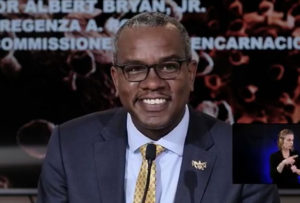
The V.I. government is working with its federal partners to offer local residential and commercial customers a credit on their electric bills, and has formed a task force to look at how to responsibly reopen the local economy in the months ahead.
“We’re trying to get that out in May,” Gov. Albert Bryan, Jr. said during Wednesday’s news briefing about when the subsidies – $250 for the V.I. Water and Power Authority’s residential customers and $500 for commercial customers – would be going out. “We’ve already gotten the Internal Revenue Bureau to line up the names of the people and the amounts to be paid and the only thing we are waiting on now is for the U.S. Treasury to send us the funds.”
Treasury, he added, is working on a similar agreement with Puerto Rico and the U.S. Virgin Islands is next on the list. Once disbursements are ready, they will be credited to the individual WAPA accounts.
Explaining the process, Bryan said the subsidy offered a solution that the Senate’s recent bill on back-billing did not: Immediate relief. This week Bryan vetoed the bill, which limits WAPA’s billing cycle to 35 days, describing it as a “reactionary” measure by the Senate that would neither “lower your bill or alleviate the 60-day billing issue.”
Further, it would hold up future projects and erode bondholder confidence in the utility, he said.
“We are dedicated to bringing down your bill permanently and shortsighted measures such as this only serve to delay the projects and keep your light bill high,” the governor said.
Additional Economic Relief
With residents out of work due to COVID-19, or laid off, the administration is looking for other ways to provide financial relief, the governor said. Updating residents on stimulus checks expected to come in the mail as a result of the U.S. Congress’ $2 trillion economic recovery bill, Bryan said the government is also awaiting final guidelines from the U.S. Treasury on disbursement and specifics on a transfer of funding that would cover whatever the territory has to pay out.
In the meantime, the timeline for getting checks out should be in the next two weeks and Bryan said that the IRB has begun identifying taxpayers and their most recent mailing addresses.
Separately, Bryan said there has been no agreement by Congress or U.S. President Donald Trump to make disaster food stamp benefits available to those who are unemployed or laid off during the ongoing health crisis. However, he said residents might be eligible for regular DSNAP benefits and unemployment insurance and should continue to check with local Labor and Human Services departments for guidelines.
Looking ahead, Bryan said he has put together a Restart V.I. Task Force meant to “provide guidance” on the best ways of reopening the local economy.
“This is not just for the immediate response to the pandemic, but to achieve a diversified and sustainable economic development path for the future,” he said.
Bryan added that right now, there is no way for the territory to know whether it is “in the eye of the storm, at the beginning of the storm or at the tail end,” but having a meaningful plan, along with effective legislation, could help the territory rebound on more solid financial footing when the economy begins to reopen.
At this point, Health Department data indicates that the number of positive COVID-19 cases are holding steady at 51, with 417 individuals tested overall and 331 negative cases. While Bryan said the numbers paint a better picture than other states and territories, now is the time to “stay vigilant” and plan ahead.
Speaking about relief on the banking side, Lt. Gov. Tregenza Roach added Wednesday that the Banking, Insurance and Financial Regulation Board has continued to work with local banks specifically on the implementation of mortgage forbearance and business relief measures laid out in the recently passed federal Coronavirus Aid, Relief and Economic Security (CARES) Act.
Roach spoke about the granting of forbearance on all federally owned or backed mortgages – such as those held by the U.S. Housing and Urban Development – which he said must be requested by the customer through the bank. Under the CARES Act, the bank will require any applicant to “affirm financial hardship,” and once the request is granted, relief is provided for 180 days. An additional 180 days can be requested but has to be done before the first 180-day term is up, he said.
Most importantly, applicants can be eligible for the program regardless of the delinquency status of their loan, he said. Forbearance is also offered to multifamily properties or borrowers of federally backed loans, but those applicants have to show they are current on their payments as of Feb. 1, Roach said. Banks, however, may not charge any more than regular interest accrued on the borrower’s mortgage account during the forbearance period.
Even if forbearance is granted, there is a temporary moratorium on evictions for 120 days, which started on March 29, Roach said.
Meanwhile, mortgages that are not federally backed can also qualify for forbearance, but Roach said each individual bank sets the terms, which could mean that customers will be required to show they are current on payment. Mortgage holders should contact their bank to find out, he said.


